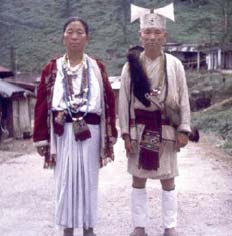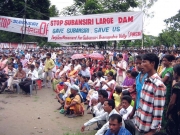Arunachal Pradesh
Adapting to climate change - Conserving rice biodiversity of the Apatani tribe in North East India - An IGREC working paper
Posted on 15 Feb, 2012 11:47 PMIt also deals with the threat to the biodiversity in the area due to climate changes and argues for the need to devise adaptation strategies at an urgent level to preserve the unique genetic variability of the region and the indigenous knowledge of farming practices in the area.
Demonstration cum dissemination of the feasibility of KAF (Kanchan Arsenic Filter) in Assam - A workshop report - IGSSS and Welthungerhilfe (26th July 2011)
Posted on 21 Nov, 2011 10:26 AMThe workshop aimed at possible replication and acceptability of KAF as a viable, low cost appropriate arsenic mitigation measure in the arsenic contaminated regions of the country.
Living rivers, dying rivers: Rivers in North East India
Posted on 15 Nov, 2011 03:29 PMRivers in North-East India

Indigenous knowledge of soil fertility management in the humid tropics of Arunachal Pradesh - Indian Journal of Traditional Knowledge
Posted on 21 Aug, 2011 05:28 PMThis paper published in the Indian Journal of Traditional Knowledge highlights the findings of a study that correlates the indigenous knowledge and scientific knowledge in assessing the nutrient availability status of agricultural soil as practised by the Nyishi tribes who use visual properties such as colour, texture and topographic positioning of land/terrain.
Role of indigenous knowledge system in conservation of forest resources – A case study of the Aka tribes of Arunachal Pradesh – A paper in the Indian Journal of Traditional Knowledge
Posted on 23 Apr, 2011 09:01 PM Indigenous knowledge is the basis for local level decision making in agriculture, healthcare, food preparation, education, natural resource management, and a host of other activities in rural communities.
Indigenous knowledge is the basis for local level decision making in agriculture, healthcare, food preparation, education, natural resource management, and a host of other activities in rural communities.
Damming North East India - Juggernaut of hydropower projects threatens social and environmental security of region
Posted on 28 Dec, 2010 07:49 PM This report by Kalpavriksh, Aaranyak and ActionAid India deals with the large dams’ juggernaut, which happens to be the biggest ‘development’ intervention in this ecologically and geologically fragile, seismically active and culturally sensitive region in the coming days. With the Northeast identified as India’s ‘future powerhouse’ and at least 168 large hydroelectric projects set to majorly alter the riverscape, large dams are emerging as a major issue of conflict in the region.
This report by Kalpavriksh, Aaranyak and ActionAid India deals with the large dams’ juggernaut, which happens to be the biggest ‘development’ intervention in this ecologically and geologically fragile, seismically active and culturally sensitive region in the coming days. With the Northeast identified as India’s ‘future powerhouse’ and at least 168 large hydroelectric projects set to majorly alter the riverscape, large dams are emerging as a major issue of conflict in the region.
Although the current scale of dam-related developments far outstrips anything which took place in the past, the region has been no stranger to dam-related conflicts. For example, the Kaptai dam, built in the Chittagong Hill Tracts of East Pakistan (now Bangladesh) in the 1960s, submerged the traditional homelands of the Hajong and Chakma indigenous communities, and forced them to migrate into parts of Northeast India.
Immediate moratorium sought on clearances for large dams in northeast India - Press release by Krishak Mukti Sangram Samiti (Assam)
Posted on 14 Dec, 2010 10:56 PM23rd November 2010, New Delhi
- Seeking a moratorium on clearances for large dams in Northeast India
- Withdrawal of clearances granted to 2000 MW Lower Subansiri, 1750 MW Demwe Lower & 1500 MW Tipaimukh dams
- Future steps on hydropower projects and dams only after full, prior and informed consent of people in the region
- Protect the Brahmaputra river basin as a cultural and ecological endowment
Seeds of Hope – Agriculture and Food Security - A Lokayan and Planning Commission study
Posted on 05 Sep, 2010 10:37 PMThis set of case studies is a part of a book prepared by Lokayan in collaboration with the Planning Commission titled “Seeds of Hope", covering themes of agriculture, biodiversity, education, forestry, governance, health, movements and water. The case studies related to agriculture and food security are summarised below:
Impact of climate change in India: An agro - ecological zone level analysis
Posted on 20 Aug, 2009 06:04 PMIndia is gifted with heterogeneous landforms and variety of climatic conditions such as the lofty mountains, the raverine deltas, high altitude forests, peninsular plateaus, variety of geological formations endowed with temperature varying from arctic cold to equatorial hot, and rainfall from extreme aridity with a few cms (<10 cm) to pre humid with world's maxim
District human development report card for 10 districts- the PAHELI report
Posted on 01 Jun, 2009 03:46 PMThe PAHELI report (Peoples' Audit of Health Education and Livelihoods) is a rapid assessment of the prevailing status of human development in a district and covers four major sectors: life and livelihoods, water and sanitation, mother and child health, and education and literacy. The design and execution of PAHELI was done by Pratham and PAHELI district partners.